As early as 1898, the First Republic of the Philippines had its own police force. This was before the country was independent. It showed a strong will to have a proper law enforcement system from the start. We will dig into the history and growth of this police force. We’ll see how it played a vital role.
Key Takeaways:
- The First Republic of the Philippines had its own police force as early as 1898.
- Explore the history and evolution of the First Republic of the Philippines’s Police Force.
- Learn about the roles and contributions of the police force in maintaining peace and order.
- Discover the formation of the Philippine National Police and its integration with the Armed Forces.
- Understand the challenges and controversies faced by the Philippine National Police.
Origins of the Philippine National Police
The Philippine National Police has deep historical roots. It was strongly influenced by colonial powers.
Legacy of the Spanish Guardia Civil and American Influence
“The Spanish Guardia Civil and American governance were crucial in forming the Philippine National Police.”
The Spanish Guardia Civil was key during the Spanish rule. They helped keep peace in the Philippines. Their work laid the foundation for a proper police force.
After the Spanish-American War in 1898, the U.S. governed the Philippines. They brought in modern policing like a single, strong police force. They based their efforts on American policing principles.
This mix of Spanish and American impacts was vital. It started the journey to a full-fledged national police force in the Philippines.
Formation of the Philippine Constabulary in 1901
“The year 1901 saw the birth of the Philippine Constabulary as the main law enforcement unit.”
The “Philippine Constabulary Act,” known as Act No. 175, laid its foundation. This act put the Constabulary in charge of policing. It took over from the Spanish and American groups. It was both a police and a military unit, keeping law and order.
This step was crucial for forming a strong countrywide police force. It prepared the journey for the Philippine National Police.
| Year | Milestone |
|---|---|
| 1898 | Spanish-American War leads to American occupation of the Philippines |
| 1901 | Formation of the Philippine Constabulary |
Evolution of Policing in the Philippines
The Philippines has seen big changes in policing over time. It started small and grew into a major force. We will explore how law enforcement grew and changed, leading to the modern Philippine National Police.
Integration and Expansion of Law Enforcement
Key to the development of Philippine policing was merging different groups. In 1901, the Philippine Constabulary started a new chapter. It brought together scattered units, improving their ability to keep the peace.
As the country developed, more police work was needed. Specialized units were formed, like those for traffic, drugs, and cybercrime. This move made the police more effective and made the public safer.
Transition to the Modern Philippine National Police
The shift to the Philippine National Police was a major change. It aimed for a stronger, community-focused police. The idea was to create trust and make the service better for Filipinos.
This change meant the PNP took on more tasks. It became the main body for order, crime prevention, and safety. The PNP working with local governments helped make security closer to the people’s needs.
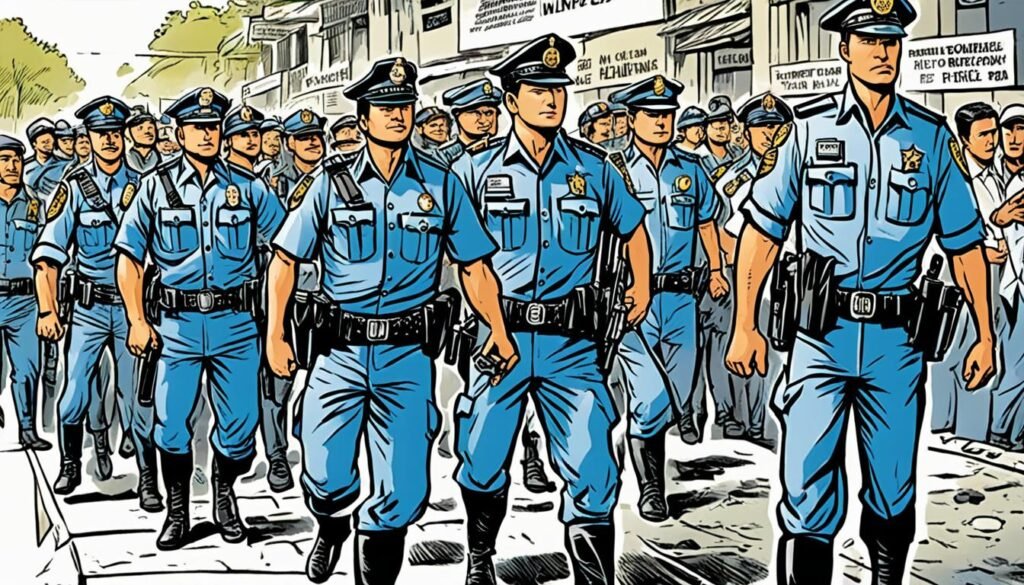
From small starts to a national police force, the Philippines evolved. It embraced change and advanced to meet new challenges. Always aiming to serve and protect, the Philippine police continue to improve for the people.
Motto and Core Values of the PNP
In the Philippine National Police (PNP), the motto “To Serve and Protect” stands for its core values. These values run through the PNP’s culture and work. They shape how every member thinks and acts.
Inculcating “To Serve and Protect”
The motto tells PNP staff they are here to help and keep people safe. It’s all about serving the community and looking out for everyone. This shows the PNP’s aim to keep peace and safety by following the law.
Adherence to Service, Honor, Justice
Service, honor, and justice are key for the PNP’s success and professionalism. They help guide the police when dealing with the public and making choices.
Service: The PNP puts top-quality service first. Everyone in the force aims to help the community, meet their needs fast, and protect them.
Honor: Having honor is very important for the PNP. Staff must be truthful, brave, and act with a good moral code. They are watched and must be transparent, behaving in a way that makes the PNP proud.
Justice: Working for justice is crucial. The PNP ensures laws are followed, treats everyone fairly, and defends people’s rights. They want the community to feel safe, making justice and trust important goals.
These motto and core values show the PNP’s strong commitment to the public. They show the importance of service, doing the right thing, and fairness. These are key to earning trust, keeping peace, and creating a safer place for Filipinos.
Philippine Constabulary: A Precursor to the Police Force
The Philippine Constabulary was a key step towards the Philippine National Police as we know it today. It began its work on August 18, 1901, during the American rule in the Philippines. Its job was to keep the peace, fight crime, and make sure the Filipino people were safe.
As an image:
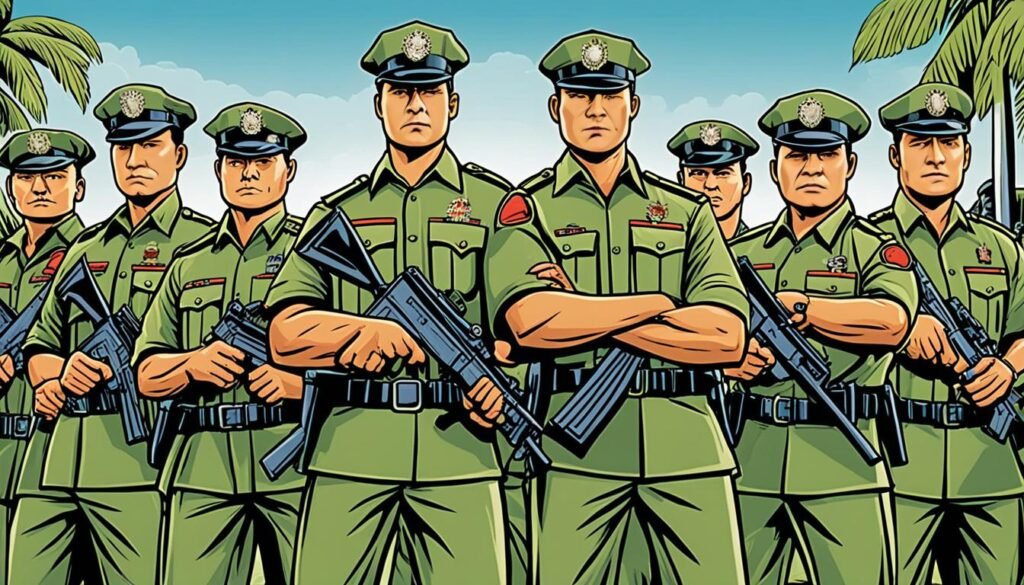
This group was the main force for law and order in the Philippines for a long time. It set and enforced laws, kept things in check in the countryside, and handled security problems all over the land.
The Constabulary faced big challenges like terrorism, uprisings, and organized crime. It was managed by the Americans and worked closely with the military. Together, they dealt with these big security threats.
Let’s see just how important the Philippine Constabulary was. We’ll look at its main jobs and what it managed to do:
“The Philippine Constabulary provided stability and security during a critical period in Philippine history, setting the foundation for the modern police force we have today. Its dedication to maintaining peace and order helped shape the law enforcement landscape in the country.”
| Main Tasks | Achievements |
|---|---|
| 1. Maintenance of peace and order | – Establishment of law and order in rural areas – Suppression of criminal activities and banditry – Efficient response during emergencies and calamities |
| 2. Combating insurgency and terrorism | – Coordination with the military in addressing security threats – Disruption of insurgent and terrorist activities – Protection of vital infrastructure and key installations |
| 3. Safeguarding the country’s borders | – Prevention of smuggling and illegal activities – Border control to regulate the entry and exit of individuals and goods – Assistance to customs and immigration authorities |
| 4. Ensuring public safety | – Traffic control and management – Promotion of road safety awareness – Assistance in disaster response and relief operations |
The Philippine Constabulary put in a lot of effort to maintain peace. Because of its hard work, we now have the Philippine National Police. This laid the groundwork for modern policing in the Philippines, affecting how we view safety and law enforcement.
Administrative Structure and Leadership
The Philippine National Police (PNP) has a detailed administrative setup. It ensures the organization is well managed and led. The National Police Commission (NPC) watches over the PNP’s actions.
National Police Commission’s Oversight
The National Police Commission is very important in the PNP. It makes sure the police are held accountable. This independent group appoints and promotes officers. It looks into complaints and aims to have a police force that follows the law and acts professionally.
Want to know more about how strategic management works in the police? You can check out the Strategic Management in Policing guide.
Key Figures in PNP Leadership
In the PNP, there are important leaders who guide it. They make big decisions and set policies. Some of these leaders are:
- Archie Francisco F. Gamboa leads the PNP as Chief. He oversees its strategies and daily work. His job is to make sure the police follow the rules and keep the peace.
- Camilo Pancratius Cascolan is the Deputy Chief for Administration. He manages the PNP’s behind-the-scenes work. This includes managing resources and helping police do their jobs well.
- Guillermo Lorenzo T. Eleazar is the Deputy Chief for Operations. He looks after the PNP’s actions against crime. His work is about making sure the police are ready and keep people safe.
These leaders show the dedication needed to keep the Philippine National Police professional and trustworthy.
https://www.youtube.com/watch?v=cPz3kAo_Vk8
National Reach and Operational Jurisdiction
The Philippine National Police (PNP) has grown to cover the whole country. Its main job is to keep the peace and order, making sure all Filipinos are safe.
The PNP’s leaders work together under a Chief, chosen by the Philippines’ President. This setup helps in making decisions that help every area stay safe.
But, each local police group is managed by the place it’s in. They follow the PNP’s rules but work with their local leaders too.
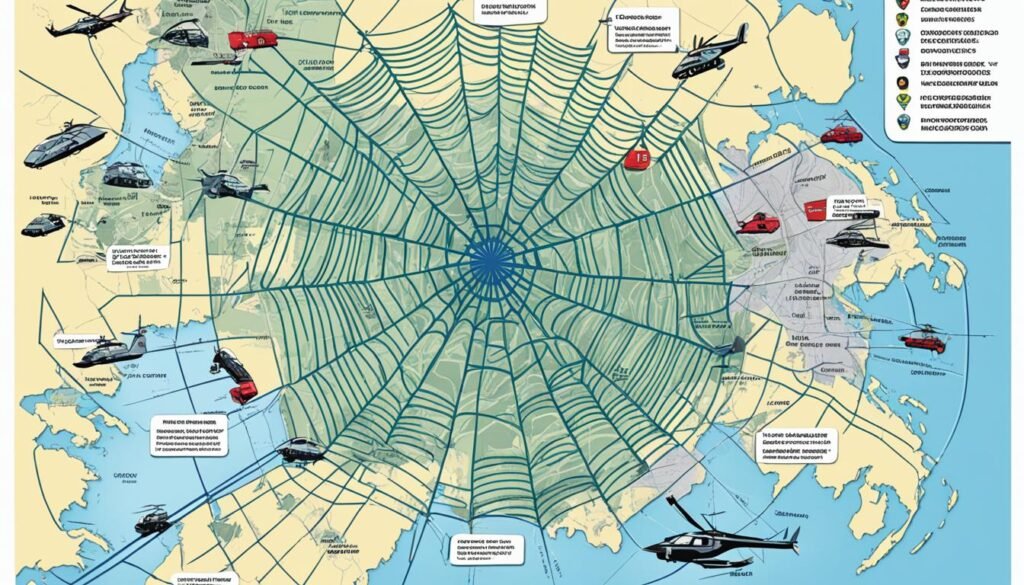
The PNP teams up with local areas like barangays, towns, and cities to fight crime and keep people safe better. This way, they can tackle problems that are special to each place.
Want to know more about the Philippine National Police? Find out about how it’s set up and what it does on the Philippine National Police Wikipedia page.
The PNP’s Integration with the Armed Forces
In the Philippines, during martial law, the Philippine National Police (PNP) working with the Armed Forces was very important. This helped keep law and order. The Philippine Constabulary (PC),a forerunner of the PNP, enforced martial law. They helped keep the regime in power.
The PC got more power under martial law. It was directly controlled by the Armed Forces. PC officers enforced curfews and caught threats to national security. Working closely with the military, they acted quickly and together.
When martial law ended in 1981, things changed. The PC became the Philippine National Police. It became separate from the Armed Forces but still worked closely with them.
The PNP wanted to be more professional after martial law ended. It wanted to stand on its own while still supporting democracy and human rights. They improved how they recruited and trained officers. Plus, they set up ways to make sure they followed the rules and were watched by civilians.
During martial law, it was clear a strong security team was needed. But, it was also important to keep the police force and the military separate. This was needed to protect people’s rights and democracy.
The PNP is changing to meet today’s challenges. It’s important to still have civilian oversight. But, working with the military can be needed in special situations. This is key for the PNP to do its job well and protect the people’s rights.
Sources: State Department Report on Human Rights Practices in the Philippines
Primary Functions and Duties
The Philippine National Police (PNP) is key in keeping the peace and making sure people are safe in the Philippines. It has a wide range of tasks to make sure the safety and well-being of Filipinos are protected. They fight to keep peace, prevent crime, and solve crimes through investigations.
Maintenance of Peace and Public Safety
The PNP’s main job is to keep peace and safety all over the Philippines. They work to enforce laws, prevent and stop crimes, and react quickly to emergencies. By watching over communities, making sure traffic laws are followed, and doing their regular duties, the PNP hopes to make life safer for everyone.
Crime Prevention and Investigation Efforts
The PNP is very active in stopping crimes and catching criminals to keep society safe. They gather intelligence, analyze it, and work with other law enforcement groups to find and catch lawbreakers. They also do thorough investigations, gather proof, and cooperate with the courts to make sure criminals are punished properly.
As part of their fight against crime, the PNP does a lot of work with the local community. They aim to create trust, encourage people to help, and support actions that prevent crimes. By involving the community, the PNP hopes to make everyone there feel responsible for their area’s safety.
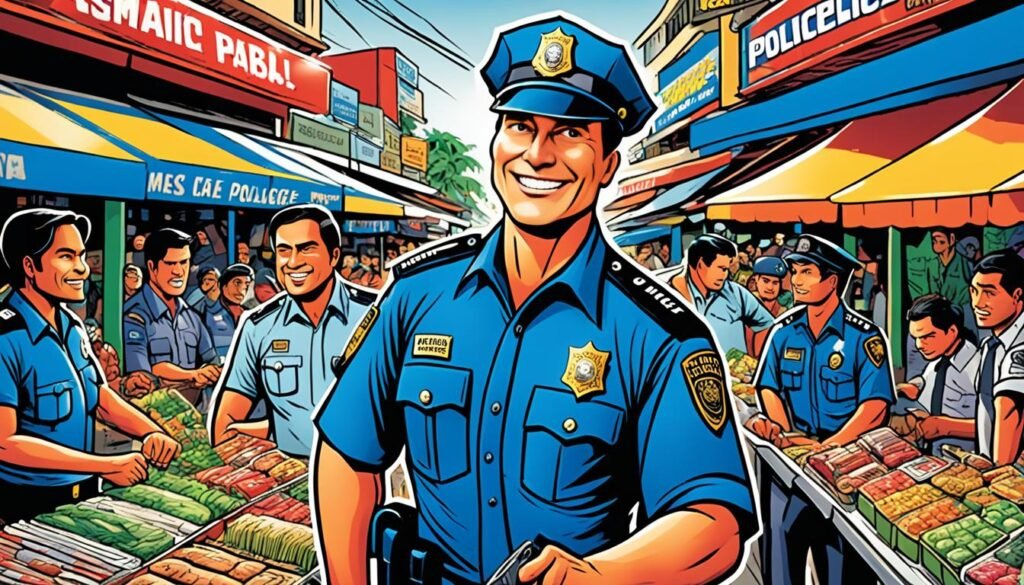
Education and Training of the Police Force
Understanding the education and training of the Philippine police is essential. It shows how they get the skills to do their job well. The Philippine National Police (PNP) focuses on continuous learning and growth. This helps officers be ready to protect the communities they work in.
https://www.youtube.com/watch?v=8r8oeAYGGe4
Education and training for the police are deep and aim to prepare them for all aspects of their work. The PNP has courses that cover everything from preventing crime to being a leader. These classes are both in the classroom and in real-world settings.
The PNP works with schools to make sure officers have the right foundation in criminal justice. This helps them think critically and handle challenges they face at work.
The PNP also pays a lot of attention to physical fitness and tactical skills. Besides physical training, officers take tests to prove they can use firearms safely. They also learn special tactics for different situations.
For growth, PNP officers can take more advanced training and join workshops. These keeps them up-to-date with new technology and ways of policing.
The PNP’s focus on learning shows their goal to have a skilled police force. This police force aims to keep peace, fight crime, and protect communities. By always learning, officers stay ready for the tough tasks of their job.
Human Rights and Policing Ethics
Respecting human rights and keeping ethical standards is key for the Philippine National Police (PNP). They aim to create a culture of respect and honesty. This includes protecting people’s rights and treating everyone fairly.
Promoting a Culture of Respect and Integrity
The PNP is working hard to make sure its members respect and are honest with people. They run training programs that focus on being professional and respecting human rights. The PNP wants to earn the trust of the Filipino people by practicing these values.
Also, the PNP wants to be open and accountable. They work closely with local communities. This teamwork helps make sure the police services are fair and effective for everyone.

The photo shows how committed the PNP is to human rights and ethics in policing.
Handling Cases of Abuse and Oversight Mechanisms
The PNP knows it’s important to deal with abuse cases without delay. They have put in place ways to check on these cases. This ensures that those who do wrong face the consequences.
The National Police Commission (NPC) is key in watching over police actions. They check on how the police behave, look into complaints, and suggest changes to stop bad behavior in the future. Thanks to the NPC, the PNP is always trying to get better and keep the trust of Filipino citizens.
The United Nations Office on Drugs and Crime underlines why police needing to be honest, accountable, and overseen is crucial in democratic states. The PNP is committed to these ideas, helping create a society where justice and fairness rule.
The PNP is doing its part to make sure respect and honesty are at the core of what they do. They are taking action against abuse and setting up ways to keep everything in check. This work shows their strong stand for human rights and ethical policing.
Budgeting and Resources Allocation
Budgeting and resources allocation are key in managing a large police force like the Philippine National Police. They ensure funds and resources are used well to support the force’s work. Looking at the finances helps us see how resources are shared and why clear processes are needed.
Managing the finances of the Philippine National Police is important work. It means looking at what the organization needs and then using resources to fulfill those needs. This demands a close look and good decisions to make the best use of the money.
Deciding how to share resources in the police is based on a plan and a budget. This plan lays out what the police want to do and how they plan to do it. It considers the staff, the tools they need, training, running costs, and other support.
Being open about how resources are used is vital for public trust in the police. The PNP checks its spending to make sure it’s fair and legal. They do this through regular checks and audits to catch any problems early.
Proper budgeting and resource use are essential for the Philippine National Police to work well. It makes sure the force is funded enough to serve the Filipinos properly.
If you want to know more about how the Philippine National Police handles money and resources, the IACP’s report on budgeting is a great resource. It offers valuable data on this detailed process.
Community Relations and Civic Engagement
The Philippine National Police knows how important it is to have strong ties with the community. They believe that by actively involving people in keeping the peace, they make the country safer. This way, they can earn people’s trust and build strong partnerships for a better world for all.
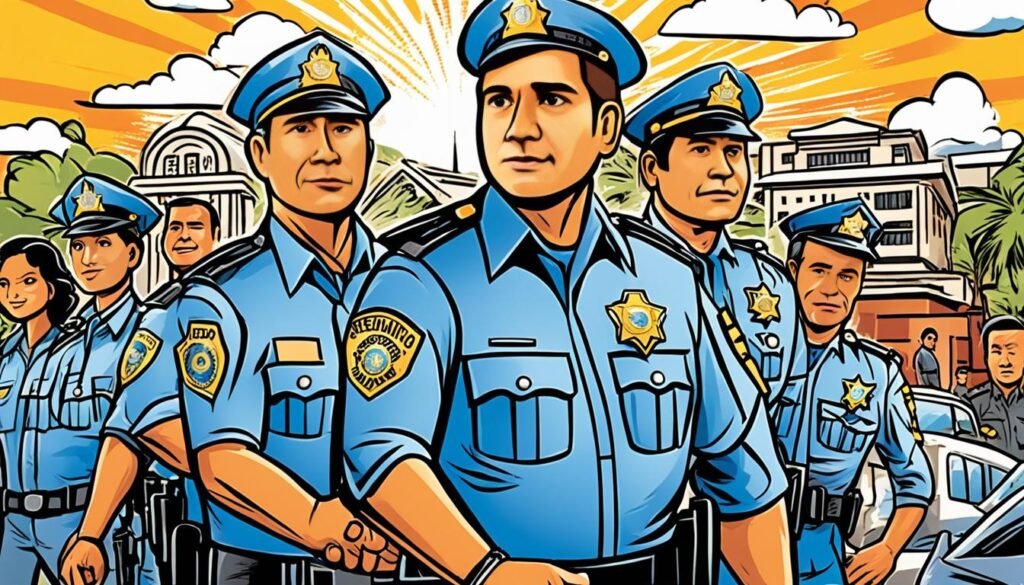
Building trust is key to policing effectively. The PNP works hard to be transparent, accountable, and always reachable. They focus on being honest, professional, and respectful in their work. This helps bridge the divide between the police and the people. It makes everyone feel protected, supported, and listened to.
Strategic Outreach Programs
Outreach efforts are essential for better community relations and civic participation. They offer chances for talking, learning, and working together between both sides. For instance, there are meetings for community policing, activities for young people, crime reduction plans, and close work with local groups.
Challenges and Controversies
The Philippine National Police (PNP) has seen its fair share of tough times. Over the years, it has tackled a number of challenges and controversies. These events have really pushed the organization to prove its honesty and effectiveness.
Two big issues the PNP has dealt with are corruption and problems within the organization. Politics has also affected how the police do their work. These matters have been key in the struggle to keep peace in the Philippines.
Addressing Corruption and Organizational Challenges
Corruption within the PNP has damaged public trust. To fight this, the PNP has put in a lot of work. They’ve done things like investigate within their own ranks, become more transparent, and set tougher rules.
Fixing issues within the PNP has also been on their to-do list. This involves making better use of things, updating old stuff, and cutting unnecessary red tape. Their goal is to work better and do more for the people of the Philippines.
Impact of Political Dynamics on Police Operations
Politics can make the PNP’s job harder. When politicians interfere or show favors, it can mess things up. This kind of meddling can make it tough for the PNP to be fair and do their job right.
The PNP is fighting back by strengthening their own rules. They want to make sure the right people get the job based on skills, not who they know. They’re also working hard to remind everyone in the force about the importance of serving with fairness and respect for the law.
Conclusion
The development of the Philippine National Police has been crucial in keeping peace and order in the country. It all started with the Spanish Guardia Civil and was influenced by the U.S. during colonization. This led to the creation of the Philippine Constabulary in 1901.
The police force has grown over time, becoming more advanced and united. The PNP embodies the values of service, honor, and justice, aiming to serve and protect Filipino citizens. These principles are fundamental, shaping the PNP’s culture and actions.
The PNP’s main tasks are to ensure peace and public safety. They work on preventing crimes and investigating them when they occur. The force is well-trained and educated, ready to handle their crucial roles.
Despite challenges like corruption and politics, the PNP keeps working to overcome them. By engaging with communities and encouraging people to get involved in law enforcement, they are building trust. This improves their ability to keep everyone safe.
The First Republic of the Philippines’s Police Force and the Philippine National Police stand as key protectors. They are dedicated to enforcing the law, safeguarding people, and promoting fairness. Their efforts make them vital to the country’s justice system.
FAQ
What is the origin of the Philippine National Police?
The Philippine National Police started from the Spanish Guardia Civil. It also picked up ideas during American rule. Back in 1901, it began as the Philippine Constabulary.
What are the core values of the Philippine National Police?
The core values are service, honor, and justice. Their motto is “To Serve and Protect”. This guides everything they do.
What was the role of the Philippine Constabulary?
Before today’s police, the Philippine Constabulary kept peace. It was very important during its time.
How is the Philippine National Police administratively structured?
Oversight comes from the National Police Commission. Leaders in the PNP work hard to keep the police effective.
What is the national reach and operational jurisdiction of the Philippine National Police?
The PNP manages police nationwide. It has power to enforce the law across the Philippines.
How is the Philippine National Police integrated with the Armed Forces?
Both the PNP and the Armed Forces worked closely during martial law. After, new systems were put in place for them to work together better.
What are the primary functions and duties of the Philippine National Police?
The PNP keeps the peace and safety, plus fights crime. Their main jobs are to make sure everyone is safe and to solve crimes.
What education and training programs are provided to the police force in the Philippines?
Police officers in the Philippines learn and train a lot. This makes them ready to protect and serve the public well.
What is the importance of human rights and policing ethics in the Philippine National Police?
Treating people right and with honesty are big deals in the PNP. They have strict rules to stop any bad behavior. And they watch to make sure these rules are followed.
How is the budgeting and resource allocation process in the Philippine National Police?
Money and resources are planned carefully in the PNP. Fair sharing and clear spending help them do their job better.
How does the Philippine National Police engage with the community and encourage civic participation?
The PNP loves working with the community. They try hard to build trust and get people involved in making their neighborhoods safer.
What challenges and controversies does the Philippine National Police face?
The PNP deals with problems like corruption and issues with how it’s organized. They’re working to fix these problems. Politics can also make their work harder.
Source Links
- https://en.wikipedia.org/wiki/Philippine_National_Police
- https://en.wikipedia.org/wiki/Philippine_Constabulary
- https://core.ac.uk/download/pdf/81291374.pdf

